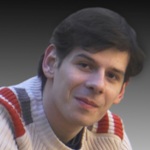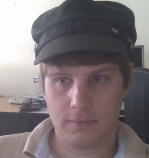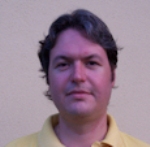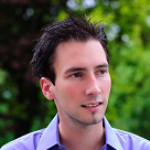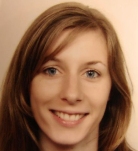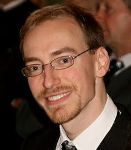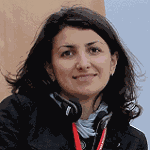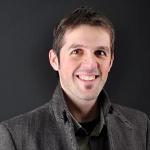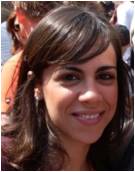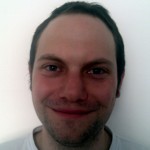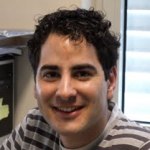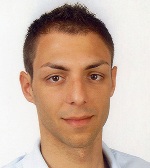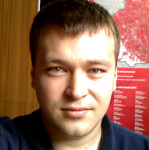|
Vlad LAPADATESCU |
CERN, Geneva - Switzerland |
|
|
I am a fellow, currently working within CERN's openlab on a research project in collaboration with HP Procurve, which aims to improve the Wi-Fi network deployment and operation in large campus environments. As research on optimal deployment and operation of big-scale installations is still in its infancy, the team that I am a part of will carry out a research activity and provide new algorithms, guidelines and solutions that will support the deployment and operation of the Wi-Fi infrastructure at CERN. Results of the research could then possibly be incorporated into HP ProCurve hardware and software to provide even more robust and efficient networking solutions. |
|
Petri LEHTONEN |
CERN, Geneva - Switzerland |
|
|
Currently I am working at CMS Computing at CERN. My work is focusing in software used on Tier-0 level. Testing, validation and debugging of Tier-0 software and its compliance with CMS software and other systems are my main duties. Along with previous, I implement statistics and monitoring software to follow the usage of resources and to monitor data processing flow in our software. I am familiar with most common operating systems and around 10 different programming languages. At work I currently use scientific Linux and python. What I am looking from the school is knowledge of physics computing and accelerator technologies in overall.” |
|
Stefano LONGO |
INFN, Legnaro - Italy |
|
|
My collaboration with the AURIGA group (http://www.auriga.lnl.infn.it) has started during my thesis, when I worked on the development of the experiment acquisition system (multi-process OOP C++ application run by Linux systems interfaced with various HW front-ends like VXI digitalization devices, GPS timing sources, etc.) I was then involved in the development of the local computational center and in the development of some analysis software. The former is a small Linux based computational center that supply all the services needed by the AURIGA collaboration: user management (NIS for Linux and samba domain for windows users), storage (some tens of TB from various NFS for experimental and user data), a small cluster used for data analysis (80-90 computational nodes), DBMS, web server, tape backup and replication services, etc. In that last 1.5 years I worked for the RareNoise collaboration too (http://www.rarenoise.lnl.infn.it), mainly on the thermal design of the experimental apparatus and the acquisition/control software (multi-threaded windows applications written in C#). At present I still work for both collaborations. |
|
Alexander LOTH |
CERN, Geneva - Switzerland |
|
|
In August 2009 I graduated in Business Information Systems participating to the CERN Technical Studentship programme. I was working on analysis and optimization of the performance and scalability of the conditions database. From June 2010 I am PhD student in IT/ES group at CERN working on caching technologies for the detector conditions data of several experiments. The practical work of this project is expected to lead to several deliverables that are relevant to the LHC experiments in the context of the Persistency Framework project. |
|
Jelena LUETIC |
Faculty of Electrical - Mechanical Engineering and Naval Architecture, Split - Croatia |
|
|
I am currently writing my master's thesis in CMS collaboration, with a group working on electron reconstruction. My topic is measurement of cross section for production of Z boson in proton collisions. This requires the knowledge of both C++ and ROOT. During my studies I also took three programming courses two in C and one in Fortran where we did many of the commonly used numerical methods. I am also familiar with Windows and Unix operating systems. Last summer, when I was CERN summer student, I did some programming in Labview. I am also familiar with Mathematica and LaTex. |
|
Wolfgang LUKAS |
CERN, Geneva - Switzerland |
|
|
I am working for the Fast Track Simulation (FATRAS) group on the material description and material interactions validation of the ATLAS detector. FATRAS provides a fast alternative to the full Geant4 simulation. It is calibrated with Geant4 simulation data and will be validated with real data from the ATLAS experiment. An overall aim of my work is to achieve a fast tuning and calibration cycle for FATRAS and to provide profound feedback of material calibration information to the full MC simulation project. Later during my thesis I will participate in a MC data intensive analysis that is highly sensitive to the material budget, such as the W mass measurement. I am familiar with the operating systems Mac OS X, Linux and Windows XP, and programming languages such as C++, Python and MATLAB. I am also familiar with Athena, ROOT and Geant4 which I am using for my work. |
|
Ludmila MARIAN |
CERN, Geneva - Switzerland |
|
|
I have been graduated in 2009 with a MSc degree in Computer Science from EPFL, Switzerland. Initially, I came to CERN to work on my Master Project in the CERN Document Server Team. After finishing my studies I returned as a fellow in the same group. I am involved in developing and maintaining software for CDS Invenio, the integrated digital library developed and used at CERN. My main interests are information retrieval and data mining, and my tasks include search engine optimizations, search results clustering, ranking and sorting. For the ranking of scientific publications, I have developed several new methods based on the citation graph. I have hands-on experience with C/C++, Java, Python, SQL, parallel programming (OpenMP, SR, MPI). I am familiar with the Unix/Linux and Windows operating systems. |
|
Pablo MARTINEZ PEDREIRA |
CERN, Geneva - Switzerland |
|
|
I worked as Oracle DBA with the most important databases at CERN, such as the accelerators ones (LHC, ATLAS, etc.) also as a member of the Oracle Support group, solving users’ problems. I developed several database monitoring systems (for the storage, growth predictions, backups, etc). I worked with the NetApp storage systems (NAS), like recovering data with snapshots. |
|
Almudena MONTIEL |
GSI, Darmstadt - Germany |
|
|
I studied BSc Computing Engineer at the University of Seville, Spain. I got my MSc in Grid Computing and e-Engineering at Cranfield University, Bedfordshire, UK, in 2008. After my studies, I have been working in small projects related to Databases, Data Mining and Web development. I am currently working as a research member for the Spanish Ministry of Innovation. My project is located in GSI Darmstadt, Germany. I work developing for AliEn. AliEn is a Grid middleware tool developed as single entry point to the Grid for ALICE experiment at CERN. This middleware is going to be adapted for the new facility at GSI-FAIR, Germany. Currently this middleware is integrated only with MySQL RDBMS. My goal is to develop an interface for this middleware to be open to any RDBMS, specifically Oracle RDBMS. As an intern at GSI, I also have the chance to keep learning. I just attended the International Winter School for Grid Computing 2010, where the following technologies were taught: Condor, UNICORE, Globus and gLite. Operating Systems: Linux, Unix, MacOSx, Windows. Programming Languages: Java, C++, C, Perl. |
|
Moritz NADLER |
Institut für Hochenergiephysik, Vienna - Austria |
|
|
I am working on the material estimation for the currently planned Belle II detector at KEK in Japan. As part of this work I am testing at the moment with Kalman filter algorithms if the information provided by the planned 6 layer tracker and planned CDC of Belle II is good enough to provide a correct estimation of the thickness of the detector layers. This testing is done with self written Matlab programs. The final results will be implemented with the future Belle II Framwork written in C++. OSs I use and work with: Linux and Windows Languages I currently with: Matlab and C++ Languages I have worked with or learned at university: Java, Python and Fortran 90 |
|
Carlos OLIVEIRA |
University of Aveiro - Portugal |
|
|
My present work is on simulation and optimization of micro pattern gaseous detectors like GEM, MHSP, MicroMegas, etc. Some of them are already implemented on some LHC experiments and others can be part of future upgrades. At this moment I am involved in the development of a noble gases electroluminescence simulation toolkit based on GARFIELD and Magboltz programs (developed at CERN - contact person Rob Veenhof). I work in Linux (Ubuntu and Scientific Linux) and also have knowledge of Windows (XP, Vista and 7). I do computer programming with python, Fortran, BASH, MatLab, C and C++ languages. |
|
Massimo PALADIN |
CERN, Geneva - Switzerland |
|
|
I graduated from the University of Udine with a bachelor’s degree in Computer Science. I am studying towards a master’s degree in Computer Science at Udine, and I am presently working on my final thesis as a Technical Student at CERN in the IT Department. During summer 2009 I have been working as an openlab Summer Student at CERN in IT/GS/DMA. I have been working on HammerCloud, a stress-testing system to commission grid sites for distributed analysis activities. I am presently working in CERN IT department, Grid Technology group, "Tools for Operations, Monitoring" section. The main area of my work is development of the WLCG monitoring infrastructures that relies on ActiveMQ, an Enterprise Messaging System. In particular I have developed a system, based on Nagios, to monitor WLCG monitoring and messaging infrastructure and react in case of anomalies. I am also doing research in the area of application flow monitoring to observe the information flows between the components in the system in order to detect abnormal behaviors at higher levels.
|
|
Alexander PRISTAVKA |
Institute of Physics and Technology, Kharkov - Ukraine |
|
|
After graduating in 2008 V.N.Karazin Kharkov National University (School of Computer Science), majoring in managing information systems and technology, I began working in the National Science Centre “Kharkov Institute of Physics and Technology” (NSC KIPT). So I became acquainted with GRID. Scientific activity of our group is primarily concerned with computations within the CMS (CERN) experimental program. My task is to deploy and configure the necessary Grid middleware. In addition, I am involved in system administering of KIPT WLCG T-2 site, in particular, the group runs the CMS T2 site, T2_UA_KIPT and prepares for the CMS data analysis. Currently I am working on the configuration and upgrade Storage Element. I have administration experience in Linux Operating System (SLC3 - SLC5, Red Hat, Fedora, Mandriva, OpenSuse), and Windows (98, 2000, XP, Windows Server 2008). Familiar with programming languages such as Pascal, Delphi, PHP, MySQL, JavaScript and Bash. |
